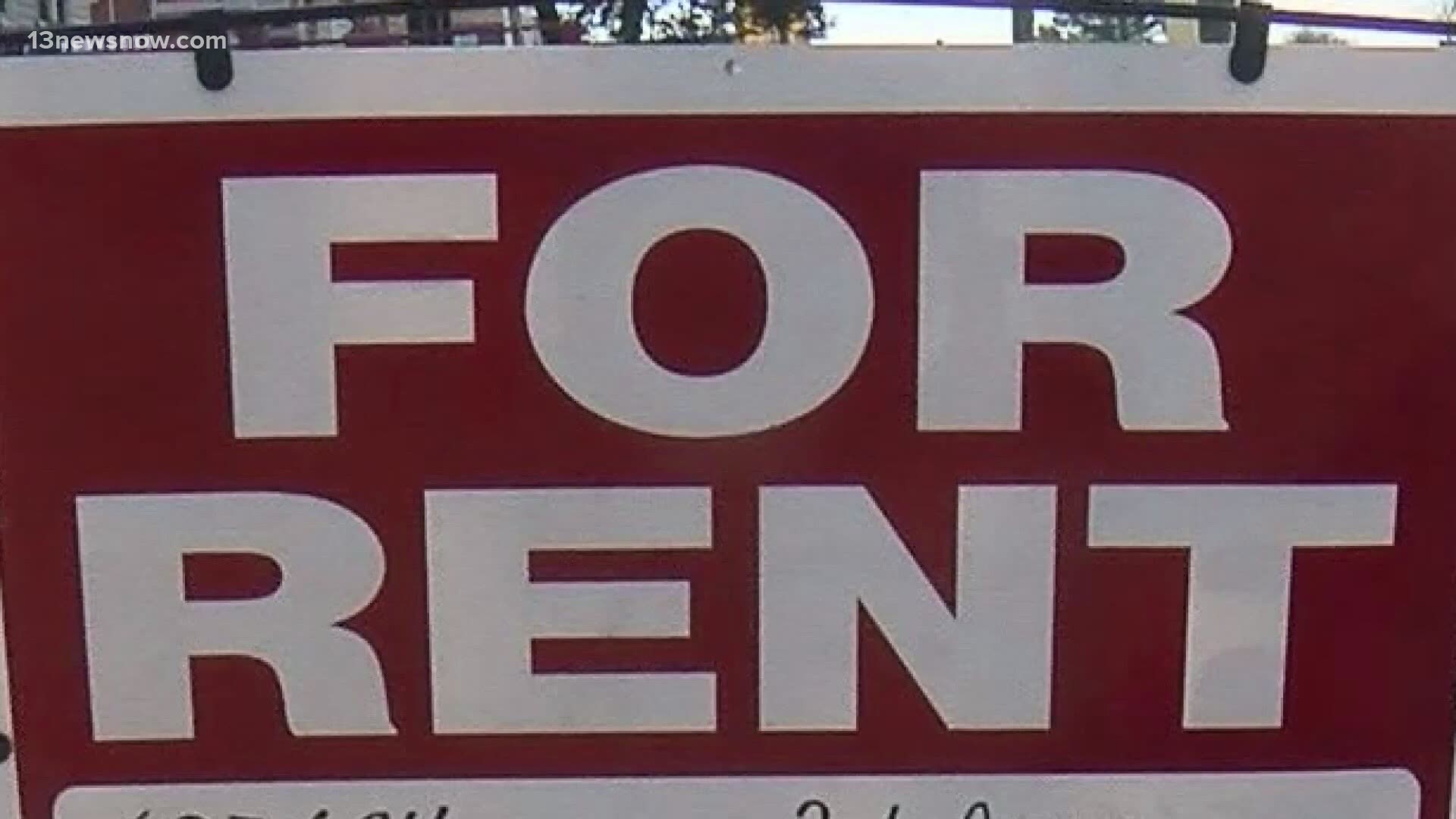NORFOLK, Va. — The nationwide pause on evictions will remain for another month.
The CDC announced Thursday it will extend a federal eviction moratorium again through July 31. The program, designed to prevents the eviction of tenants struggling to pay rent because of the COVID-19 pandemic, was previously scheduled to end on June 30.
However, a memo released by the CDC said ‘an unexpected and avoidable surge of evictions is likely’ if the moratorium ended in June.
This is expected to be the final extension of the temporary halt, according to the CDC.
"Be proactive. Don't be reactive," said Patrick McCloud, C.E.O. of the Virginia Apartment Management Association.
Housing experts advise renters to talk with their landlords as soon as possible and get on the same page before the July 31 deadline.
In Virginia, McCloud does not think the moratorium's expiration will drastically change anything for landlords, which he credits to the Virginia Rent Relief Program.
Gov. Ralph Northam announced $524 million in new federal stimulus funds toward the fund in February.
The program helps families affected by the pandemic stay in their homes, and it also assists landlords with rent payments to avoid eviction. Virginia will pay a maximum of 15 months rent to help tenants during the pandemic.
Both tenants and landlords can get more details on the application process and find out if they’re eligible at this website.
McCloud said it remains in the best interest of the landlord to apply for renter's assistance on behalf of the tenant, and he believes there is enough money in the program to support landlords until 2022.
“I think a lot of people think landlords want to evict people. Evictions are expensive and frankly, it doesn’t make sense when you have a Rental Assistance Program,” he said.
But, renters should communicate with their landlords about their financial status or any struggles to pay rent.
“If the resident does not communicate, we have no option," he said. "Time is the commodity in rental housing, and we can't afford to have units that sitting with people in them with no one paying rent. That's not good for anyone, and it drives up housing costs for everyone else."
In Norfolk, Jennifer Moore, Communications Director for the Norfolk Redevelopment and Housing Authority, said they are ready to assist the thousands of people housed through the agency.
“As the Housing Authority the last thing we want to do is evict any resident for a rent-related matter during this pandemic," said Moore.
The NRHA oversees public housing within the department and oversees recipients of Housing Choice Vouchers, also known as Section 8 housing. In both cases, tenants should let them know as soon as possible about any income changes or if they know rent will be a challenge, said Moore.
Housing Choice Voucher recipients live under independent landlords with the help of financial assistance.
Pamela Jones-Watford, program director for Housing Choice Vouchers at NRHA, said their team proactively reached out to tenants with options and
“Hopefully this will not have any impact on our program participants,” said Jones-Watford.
Under the program, everyone with a voucher pays a portion of their income toward rent and utilities. However, Jones-Watford says if someone experiences any loss of income or benefits during the pandemic, he or she only needs to report that change to her office and NRHA will quickly lower the rent portion that individual may owe their landlord, upon verification.
She said the Voucher Program even eased the verification process by allowing people to submit income loss without third-party confirmation.
“Any person on our program that has lost income, lost wages, lower wages or any benefits, we would definitely pick up that slack of any portion they had,” said Jones-Watford.
She hopes residents in the Housing Choice Voucher program will not run into issues at the end of the moratorium.
Jones-Watford directs tenants to financial status change forms on the NRHA website and in the NRHA lobby area, where people can visit any time during the change. Tenants can also utilize the dropbox in the NRHA lobby, and Jones-Watford said the payment adjustment will be effective within a month.
For those living in public housing, Moore said the housing association wants to work with residents and offers payment plans if he or she is behind on rent. They want to help people stay in their homes, but Moore said residents must communicate with the NRHA.
“Because if we don’t know we can’t provide that specialized assistance,” said Moore.
Moore said the NRHA has reached an agreement with a third-party company that handles tenant’s online payments to lower the rate for people paying rent online. The NRHA is also waiving late payments and accrued rates.
Moore and Jones-Watford shared one more reminder: the moratorium doesn't mean the rent shouldn't be paid.
“The rent moratorium is not a rent forgiveness program,” said Moore.
“If you have a tenant portion, please pay your rent,” said Jones-Watford. “Do not allow the moratorium to be an excuse not to pay rent.”

